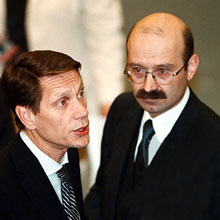 The
government's draft budget for 2005 reveals major changes in the budgetary
system. These changes point to an attempt to divide the budget into a basic
section and a section containing new commitments made by the government.
Only nine percent of budget expenditures are earmarked by the Finance Ministry
to cover the government's new obligations, a sizable portion of which is
made up of defense contracts. The
government's draft budget for 2005 reveals major changes in the budgetary
system. These changes point to an attempt to divide the budget into a basic
section and a section containing new commitments made by the government.
Only nine percent of budget expenditures are earmarked by the Finance Ministry
to cover the government's new obligations, a sizable portion of which is
made up of defense contracts.
The draft budget features a new classification that has reduced the 21
sections of the government's main economic document to 11. Another new
element in the draft is a redistribution of a number of obligations between
budgets of different levels. For instance, the federal center has taken
upon itself all civil defense outlays, the upkeep of military commissariats,
and care for the disabled. On the other hand, some responsibilities have
been shifted onto the regions: maintenance of all kindergartens, vocational-technical
schools, and some general-education schools - in all about 3,000 educational
institutions that will need around 25 billion rubles in expenses.
Many regions will apparently face acute financial problems in the next
fiscal year. That's because reform of the social security system transfers
to regional budgets expenditures on benefits for pensioners and for veterans
who worked on the home front during WWII - categories of people numbering
20 million who must be given monthly cash compensations.
Apart from that, there will be no single tariff scale next year, and
each region will index the wages of state-paid workers - doctors and teachers
above all - in accordance with its own resources, without any help from
the federal center. This also applies to children's allowances...
Thus, the regions will have a whole series of new financial obligations,
but they will get no additional sources of tax revenue. On the contrary,
1.5% of the revenues from taxes on profit and on the utilization of forest
and water resources will be withdrawn from regional budgets and transferred
to the federal budget.
Another issue of concern is the wages of state-paid workers. The salaries
of employees of educational, cultural and social security institution
are to be indexed from January 1 by approximately 15% to 17%. The salaries
of servicemen, officials of law courts and prosecutors' offices are to
be indexed according to the inflation rate - 10%. The salary indexation
will be approximately the same for civil servants.
Money from the stabilization fund, which is reaching 500 billion rubles
thanks to high oil prices, will begin to be spent next year. Prior to
2007, the fund's money will be spent only on paying the foreign debt and
eliminating the Pension Fund of Russia's deficit. Plugging the holes in
the PF budget is becoming an issue. If the state fails to cover the PF's
expenses without taking cash from the stabilization fund, it means that
the tax system does not provide enough money to cover the state budget's
current expenditures. To my mind, it's necessary to deliberate once again
interbudgetary relationships on and state spending priorities for 2005-2007.
How can we assess the upcoming changes in the budgetary process? It
is good that we are creating clear-cut budgetary procedures and trying
to evaluate federal and regional development programs. The big question
is how competently the changes will be carried out, for they are in fact
taking place at a time when the various government departments lack full
coordination in their work. This is bound to cause organizational problems
in the implementation of the 2005 budget.
I fear that the contemplated changes in the budgetary process might
bring suffering on the populace.
See also:
the original at
Moscow News
Budget 2005
|